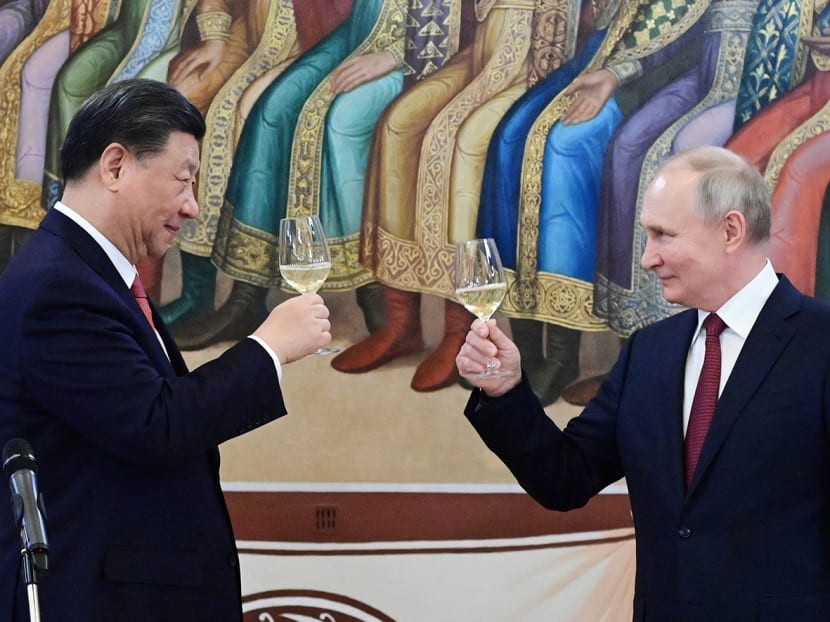Explainer: The significance of Xi Jinping's meeting with Vladimir Putin in Moscow, and what it means for the rest of the world
SINGAPORE — As the war in Ukraine grinds on, global attention has turned this week to a three-day state visit to Moscow by Chinese President Xi Jinping who was greeted warmly by Russian President Vladimir Putin.

Russian President Vladimir Putin (R) and Chinese President Xi Jinping attend a reception at the Kremlin in Moscow, Russia March 21, 2023.
- A three-day state visit to Moscow by Chinese President Xi Jinping has been described by the two countries as an opportunity to deepen the China-Russia friendship
- Both have strained relations with the West, with Russian President Vladimir Putin largely isolated over Russia's invasion of Ukraine
- The agenda for the visit included China's Peace Plan for Ukraine as well as a proposal for natural gas trade
- Some experts believe the visit more symbolic than substantial, as an expression of China's solidarity with Russia
SINGAPORE — As the war in Ukraine grinds on, global attention has turned this week to a three-day state visit to Moscow by Chinese President Xi Jinping who was greeted warmly by Russian President Vladimir Putin.
The visit, which ends on Wednesday (March 22), was officially aimed at strengthening ties between the countries and promoting Mr Xi's 12-point peace plan to end the war in Ukraine.
It marks Mr Xi's first foreign visit since his re-election to a third term and is seen as the latest development in the "no limits" friendship between China and Russia, which is largely isolated from the West over its invasion of Ukraine.
Russia has been the subject of numerous sanctions from across the globe over its invasion of Ukraine, but China, a fellow member of the United Nations Security Council, has not joined in that international effort.
Mr Xi has tensions of his own with the West over issues such as the future status of Taiwan.
The visit by Mr Xi also follows a recent warrant issued by the International Criminal Court (ICC) for the arrest of Mr Putin over an alleged scheme to abduct Ukrainian children and send them to Russia.
TODAY takes a look at why the Xi-Putin meeting is significant and the implications for the rest of the world.
HOW DOES THE MEETING BENEFIT CHINA AND RUSSIA?
When they first met on Monday, the two leaders shook hands and smiled, referring to one another as "dear friend" and exchanging compliments. Mr Putin congratulated Mr Xi for his re-election earlier this month.
The talks over dinner that day lasted over four hours, reflecting the close personal bond forged between the men, who in 2018 cooked Russian pancakes together on the sidelines of an international meeting.
The visit marks an opportunity for both countries to portray each other as a powerful ally to counter the already strained relations with the West.
The visit was also seen by some as a show of solidarity with Russia by China, coming just days after the ICC arrest warrant for Mr Putin was issued.
Assistant Professor Benjamin Ho at the S Rajaratnam School of International Studies believes that regardless of the ICC arrest warrant, Mr Xi has the upper hand in the relationship.
"China's economic muscle and Russia's economic weakness provides them (China) with leverage over Moscow, regardless of whether there is an ICC arrest for Putin or not," he said.
“China's economic muscle and Russia's economic weakness provides them (China) with leverage over Moscow, regardless of whether there is an ICC arrest for Putin or not.Assistant Professor Benjamin Ho at the S Rajaratnam School of International Studies”
WHAT WERE THE OUTCOMES OF THE MEETING?
As expected, the meeting covered China's peace plan for Ukraine, plans to form a deeper partnership on political and economic fronts, and a proposal to initiate a natural gas trade between the two countries.
Chinese state news agency Xinhua reported that both sides had exchanged "in-depth" and "candid" views on Ukraine as they sat through a seven-course gala dinner on Monday.
During a portion of Monday's meeting that was open to the media, Mr Putin said that he would discuss China's proposed 12-point Ukraine peace plan as it had been Mr Xi's priority.
Speaking at a joint news conference on Tuesday, Mr Putin said that China's peace plan is in line with Russia's approach and can be taken as a "basis for a peaceful settlement when the West and Kyiv (Ukraine's capital) are ready for it".
Thus far, China's peace plan has not specifically stated that Russia must withdraw from Ukraine — a pre-condition that Ukraine has set before it is willing to join any such talks.
Aside from Ukraine, the two leaders discussed economic ties and energy cooperation. The two leaders signed two joint documents on plans for economic cooperation and deepening the countries' partnership.
One other major development from the visit was the proposal for expanding their natural gas trade.
Both countries focused on the discussion of energy cooperation and the beneficial trade in Russian natural gas to China, and were close to an agreement following the conclusion of their meeting on Tuesday.
At the heart of this discussion is the proposed Power of Siberia 2 gas pipeline which could supply China with at least 50 billion cubic metres of Russian gas annually by 2030.
The pipeline, which would pass through Mongolia, has been a topic of discussion for years but has since taken on greater urgency after Western sanctions on Russia, including some relating to energy sales by Russia.
"It's a recognition that Russia has probably more friends in Asia than in Europe," said Asst Prof Ho. "It may also signal a shift in Russia's diplomatic approach to try to cultivate Asia rather than historically focusing on Europe."
“For Xi, it's an effort to underscore his global stature and that of the PRC. For Putin, it's to demonstrate that he still has support from an important international actor, the PRC.Associate Professor Chong Ja Ian of the department of political science at NUS' faculty of arts and social sciences”
Despite the outcomes of the discussions, experts TODAY spoke with said that the visit was more symbolic than substantial for the two countries.
"For Xi, it's an effort to underscore his global stature and that of the PRC (People's Republic of China)," said Associate Professor Chong Ja Ian of the department of political science at NUS' faculty of arts and social sciences.
"For Putin, it's to demonstrate that he still has support from an important international actor, the PRC."
WHAT ARE THE IMPLICATIONS FOR THE REST OF THE WORLD?
In a joint statement on Tuesday, China and Russia said that their strengthened partnership is not "confrontational in nature" and "not directed against third countries".
However, Western officials have continued to criticise Mr Xi's visit and argue that China is merely providing Russia with "diplomatic cover".
"I doubt this meeting will change anything of significance. So long as their interests converge strategically, they will maintain the relationship," said Asst Prof Ho.
When asked if the visit should concern the rest of the world, Assoc Prof Chong said: "I don't think there is much the rest of the world can do but to prepare for more friction and a potentially prolonged conflict by Russia in Ukraine."








